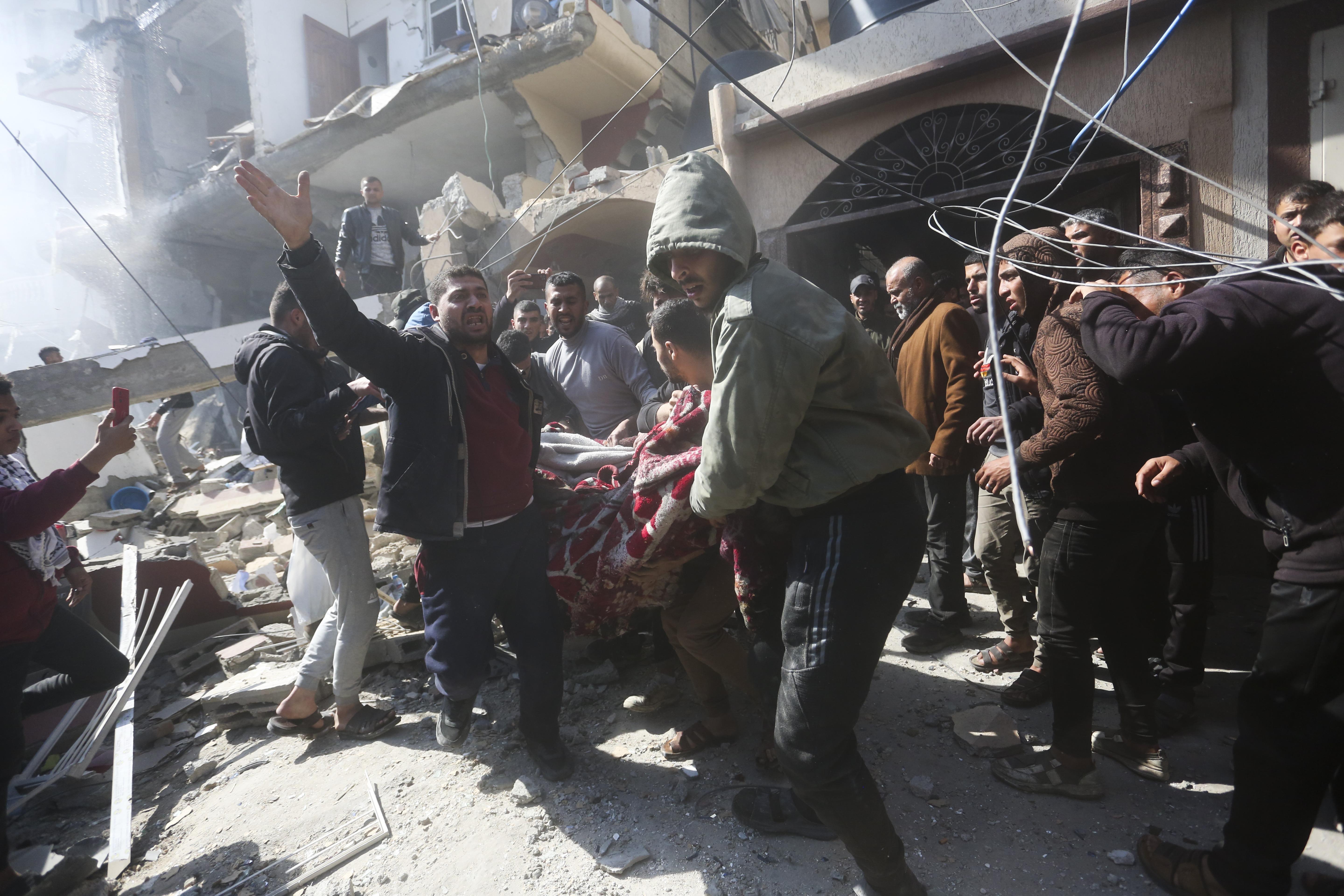As death toll mounts, Muslim states urge cease-fire; Riyadh repeats call for two-state solution
 Palestinians rescue survivors after an Israelikm strike on Shaheen family house in Rafah, Gaza, Feb 24, 2024. (PHOTO / AP)
Palestinians rescue survivors after an Israelikm strike on Shaheen family house in Rafah, Gaza, Feb 24, 2024. (PHOTO / AP)
Ahead of the Muslim holy month of Ramadan, the 57 member states of the Organization of Islamic Cooperation (OIC) adopted a joint resolution calling for the immediate and unconditional cease-fire in Gaza and resumption of aid to the UN agency for refugees. The moves came as Saudi Arabia reiterated its support for a two-state solution.
The OIC condemned the “barbaric aggression of Israel against civilians” in the besieged Gaza Strip and “the entire Occupied Palestinian Territory” and referred to what it called “the crime of genocide”, which it described as targeting of civilians “under any pretext and forcibly displacing them from their homes”.
The OIC meeting occurred as the death toll in Gaza rose to more than 30,000, and more than a million Palestinians displaced, as Israel’s expanded military operations to eliminate Hamas continued five months on. The fasting month of Ramadan starts on March 10 or 11.
READ MORE: Iran proposes to host OIC meeting on Palestine issues
Saudi Minister of Foreign Affairs Prince Faisal bin Farhan bin Abdullah, who participated in the extraordinary session of the Council of Foreign Ministers of the OIC held in Jeddah, Saudi Arabia, on March 5,
expressed concerns over Israel’s plans to scale up military operations toward Rafah despite mounting civilian suffering.
“We have noticed a positive development in the positions of some countries and an understanding of the magnitude of the disaster. We have also seen an increase in the number of countries calling for an immediate cease-fire,” the minister was quoted as saying by the Saudi Press Agency.
He also said that Saudi Arabia’s message is aimed at telling countries that the time has come for them to make a decision to recognize the State of Palestine and continue to pressure Israel to stop the war in Gaza and accept the two-state solution.
According to a Xinhua News Agency report on March 6, talks hosted by Egypt since March 3, along with the participation of delegations from Qatar, the United States and Palestinian militant group Hamas, were facing difficulties. However, the talks were still continuing, contrary to earlier reports that the Cairo meeting had ended in failure.
On March 3, US Vice-President Kamala Harris demanded that Hamas accept an immediate cease-fire while also urging Israel to ramp up aid deliveries into Gaza, where she said innocent people were suffering a “humanitarian catastrophe”.
At a United Nations General Assembly meeting of ambassadors on March 4, Philippe Lazzarini, the UN Relief and Works Agency for Refugees’ (UNRWA) Commissioner-General, said his agency was “at a breaking point” and had no capacity to absorb financial shocks.
This, after noting that 16 countries had paused their funding, totalling $450 million, amid Israel’s allegations that 12 out of 30,000 UNRWA staff were allegedly involved in Hamas’ attacks on Israel on Oct 7.
“We are in a situation where there is a political decision to eliminate UNRWA,” said Lazzarini, citing Israeli Prime Minister Benjamin Netanyahu’s announcement that there was “no place” for UNRWA in Gaza.
“Part of this campaign involves inundating donors with misinformation designed to foster distrust and tarnish the reputation of the agency,” Lazzarini said, with Netanyahu “openly stating that UNRWA will not be a part of post-war Gaza”.
The OIC in its resolution also rejected “any prejudice” to the role of UNRWA, including cancelling its mandate, and denounced “all pressures and blackmail” to the agency.
OIC Secretary-General Hissein Brahim Taha called on all countries to increase funding for UNRWA so that it can “continue its vital role in providing humanitarian and essential services to Palestinian refugees”, and contribute to enhancing stability in the region.
ALSO READ: Envoy: China continues to support UNRWA's work in Gaza
He also said that increasing the UNRWA’s funding will confirm the international community’s commitment to protecting the rights of Palestinian refugees and its responsibility to provide a just solution to their issue.
Meanwhile, Netanyahu’s office on March 5 held a discussion on preparations for Ramadan, and announced that Israel’s policy “has always been, and always will be”, to “safeguard freedom of worship for all faiths”.
This, after Israeli National Security Minister Itamar Ben Gvir had urged the police to allow a limited number of Muslims to enter the Al-Aqsa Mosque in Jerusalem during Ramadan.
The prime minister’s office noted that Ramadan “is sacred to Muslims; its sanctity will be upheld this year, as it is every year”.
During the first week of Ramadan, it said, the entry of worshippers to the Temple Mount, where the mosque is located, will be permitted, and that a “weekly assessment of the security and safety aspects will be held; a decision will be made accordingly”.


